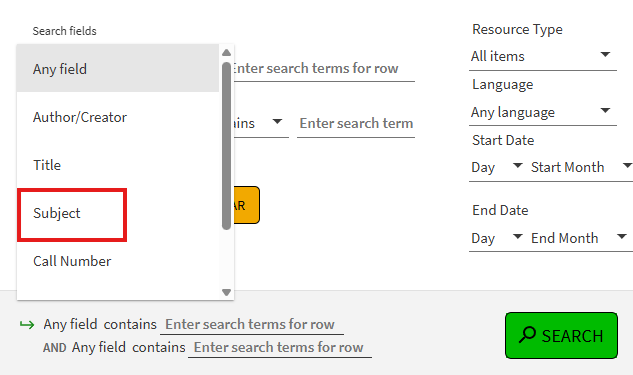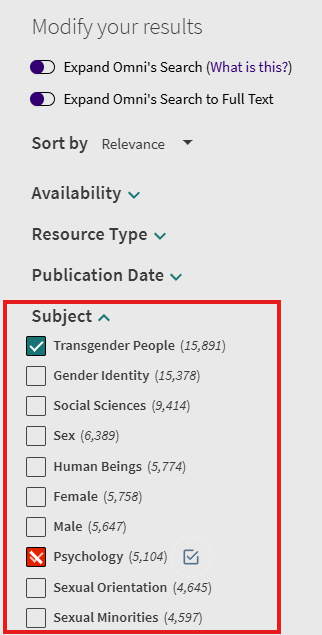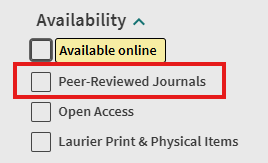Trans Research Guide
Course Number: WS
Subject: Women and Gender Studies
This guide is meant to help people doing research on trans-related issues, and takes a trans-positive approach.
Search Tips and Strategies
Search Words & Terms
The terms used to describe trans people have changed over time, and some older terms now have offensive or derogatory connotations. However, you may need to use these older terms when searching, especially for non-current topics. Some are presented here for that reason.
Here are some commonly used terms:
- transgender: most common in scholarly literature; start with this.
- trans: a more current term, but difficult to search with: searching for trans might give you transportation or Trans-Canada Highway. Always search using this term with other more specific terms, e.g. trans youth, trans people, trans identity. If you get many irrelevant results, narrow your search by Subject (see Subject Headings below).
- gender diverse
- gender nonconforming
- sexual minority
- LGBT or LGBTQ
- older terms: transsexual, transvestite, gender dysphoria
For anti-trans rhetoric, try:
- anti-trans
- anti gender ideology
- gender-critical feminism
- transgenderism
If you are not getting the results you want with one term, try others. Look carefully at your search results to identify other words people use for your concepts, then search again using those words.
Subject Headings
Trans-related Subject Headings
Subject headings are standardized words used in Library search tools. Subjects have changed over time, and some are now outdated and offensive. The older subjects are still necessary for searches on non-current topics, so some are presented here.
Trans-related subject headings in the Omni Library catalogue include:
- transgender people
- transgender persons
- transgender identity
- transgender history
- transgender culture
- transgender political activity
- gender nonconformity
- gender nonconforming people
- sexual minorities
- lgbtq people
- cross-dressing
- transsexualism
How to Search by Subject
In Omni, click on Switch to Advanced Search beside the top search bar.
In the first Search terms row, click on Any Field. Choose Subject from the dropdown menu. Enter your subject heading and click Search.
Other search tools will have the same options, but look a bit different than Omni.
How to Limit by Subject
Do your search in Omni. In the Modify Your Results column on the left, click on Subjects. A list of subjects related to the items in your search results will appear.
Check the box to the left of one or more subjects, then click Apply, to see only search results with those subject headings.
Click to the right of a subject to exclude or remove items with that subject heading from your results.
Other search tools will have the same options, but look a bit different than Omni.
Where to Search
Omni Library Catalogue
Omni Library catalogue is a good starting point for articles and books. It has some content in many areas, but does not have in-depth coverage of any area.
Subject-specific Search Tools
Specialized search tools have more articles than Omni in a specific area.
Trans-related topics can be found in many specialized search tools. The tools overlap in their content, but each has some unique content. Try more than one if you are not finding what you need. Some useful tools:
Depending on your topic area (e.g. Indigenous, history), a search tool for that specific area may work better. Choose from a list of subject areas.
Search Tips and Strategies
How to Use Search Tools
Search Words and Concepts
- Before you search, think about what words best describe the concepts you are looking for
- Look carefully at your search results for ideas about other search terms or concepts you could use in your search
- Try different combinations of search words
Limit to Scholarly or Peer-reviewed
In Omni, click on Peer-reviewed journals in the left column (under Availability) to limit to scholarly articles.
In other search tools, look for a similar peer-reviewed or scholarly limit.
Improving Search Results
Too many or irrelevant results
- Use additional search terms for more precision (e.g. trans youth identity development)
- Limit using subjects (see Subject headings)
Too few results
- Try different search words
- Try searching in a different search tool
- Try using fewer search words for less precision (e.g. trans youth identity, or trans identity)
- Look in the bibliography/works cited of relevant articles to find related sources.
- Use the cited/cited by feature of Omni to show you articles that are cited in the article or which cite the article.
Advanced Search Strategies
Phrase searching
- Use quotation marks around two or more words to indicate that you want those words to be searched as a phrase, e.g. "trans youth".
- This strategy is helpful when you get many irrelevant results, e.g. some with "trans" (or transportation, etc) and some on youth but not on trans youth.
Truncation
- Use an asterisk after the root of a word to indicate that you want any combination of letters that come after that, e.g. Canad* will give you Canada, Canadian, Canadians, Canadiana.
- Note: don't use trans*, as many words have that as a root (transportation, transit, transfer, etc).
If you have questions or problems finding what you need, Ask the Library for help.
Avoiding Anti-Trans Rhetoric: Evaluating Information
Both scholarly and popular information on trans issues can contain misinformation and anti-trans rhetoric. Some bias is obvious, but some is subtle and difficult to detect.
Always check your information. Ask questions like:
- who created and published this?
- who is the publisher and what is their purpose?
- what is the organization and its purpose?
- where does the organization's funding come from?
- does this contain common anti-trans misinformation or bias?
Here are some explanations and guides to anti-trans rhetoric and misinformation:
- Anti-Trans Extremism: The Far Right’s New Strategy to Spread Hate (Human Rights First)
- Guide to Anti-LGBTQ+ Online Hate and Disinformation (GLAAD)
- Understanding and Fighting Back Against the Anti-Trans Movement in Canada (Justice Trans)
- The Anti-Trans Movement Framework (The Commons)
Trans Studies
Introductions to Trans Studies
- The Transgender Studies Reader Remix
- Trans Studies: the Challenge to Hetero/Homo Normativities
- Introduction to Transgender Studies
- Trans Philosophy (Stanford Encyclopedia of Philosophy)
Other resources on trans studies
- trans or transgender studies (Omni results)
Scholarly Journals
Trans-related articles are published in a variety of scholarly journals from different subject areas. Some journals with a more specific focus on trans issues include:
Links to Resources by Topic
Anti-trans myths & movements
Selected searches (click to see search results):
Trans Identity, History, Activism
Selected searches (click to see search results):
Laws, Rights, Justice
Selected searches (click to see search results):
Other resources:
- Anti-trans laws in Canada map (Celeste Trianon)
- Trans rights (Cornell University, US focus)
Media & popular culture
Selected searches (click to see search results):
Science & medicine
Selected searches (click to see search results):
Archives
Archives preserve a record of trans voices and history.
- Transgender Archives (University of Victoria)
- Arquives Trans Collection (Toronto)
- Digital Transgender Archive
- Louise Lawrence Transgender Archive
- Tretter Transgender Oral History Project (University of Minnesota)
- GLBT Historical Society (San Francisco)
Trans-Positive Citation Practices
Citation practices and systems are not neutral. Consider which voices are being privileged in your citations. Think about how you use and refer to trans authors in your writing. Cite correctly and respectfully.
Resources
Other Resources
- Spectrum Waterloo Region (support services)
- OK2BME (support services)
- Gender Variant Working Group (Waterloo)
- pflag Canada (Kitchener-Waterloo-Wellington-Perth chapter), useful resource for trans allies
Created by Dr. H.F. Pimlott and Joanne Oud. Last updated July 2025.





